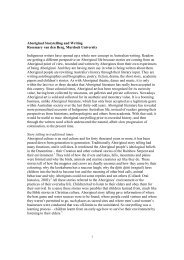Edward Koiki Mabo: The Journey to Native Title - [API] Network
Edward Koiki Mabo: The Journey to Native Title - [API] Network
Edward Koiki Mabo: The Journey to Native Title - [API] Network
Create successful ePaper yourself
Turn your PDF publications into a flip-book with our unique Google optimized e-Paper software.
Eddie <strong>Mabo</strong><br />
woman, in Oc<strong>to</strong>ber 1959. <strong>The</strong>y saved enough <strong>to</strong> begin buying a house and had<br />
settled in<strong>to</strong> a comfortable suburban existence when <strong>Koiki</strong>’s increasing involvement<br />
in black and white politics again brought him in<strong>to</strong> conflict with forces of reaction in<br />
Queensland that identified black activism with white political radicalism.<br />
While working between 1954 and 1957 on luggers that visited the mainland, he<br />
had realised how exploited Torres Strait Islanders were in comparison with white<br />
workers. Islanders were given, he estimated, about one quarter of the wages of an<br />
equivalent white worker and even this income was controlled by a paternalistic<br />
administration. He realised islander initiative was being stifled because the islander<br />
owners of company boats had <strong>to</strong> sell their shell <strong>to</strong> the Queensland government at a<br />
much lower price than the owners of master boats received. He also realised that the<br />
Queensland government was subsidising its administration through its involvement<br />
in the Torres Strait Island fisheries. Although the Queensland department of native<br />
affairs practised a policy of soft, personalised control with regard <strong>to</strong> Torres Strait<br />
Islanders, <strong>Mabo</strong> realised that his people were just as effectively ‘kept in their place’<br />
as an inferior caste as were Queensland’s Aboriginal people. He was later <strong>to</strong> entitle<br />
one of his notices in the native title campaign: ‘Qld Govt is our Friendly Enemy’. 5<br />
In 1960, at Hughenden in western Queensland, <strong>Mabo</strong> had become involved with<br />
the trade union movement when he became a spokesman and union representative<br />
for Torres Strait Islanders working on the Townsville-Mount Isa rail-reconstruction<br />
project. This involvement was <strong>to</strong> deepen when he moved back <strong>to</strong> Townsville. In the<br />
west, he had personally encountered racism in the workplace, brushing it aside with<br />
a quite dignity that reflected his assessment that this was what you had <strong>to</strong> expect<br />
from white Australia. When it affected his young wife and their two small children,<br />
he found it much harder <strong>to</strong> <strong>to</strong>lerate:<br />
Several times we brought our kids in <strong>to</strong> Hughenden when they were sick and the<br />
doc<strong>to</strong>r would see them — Eddie and Maria for instance, when they were babies,<br />
when we were out west. And we couldn’t get a lift. We didn’t have a vehicle at that<br />
time ... And there was no way of getting back so we had <strong>to</strong> go <strong>to</strong> the nearest pub, or<br />
whatever, and ask for a room. And for all the times that we used <strong>to</strong> come in, all of<br />
the pubs didn’t take us. <strong>The</strong>y wouldn’t accept black money, or probably they thought<br />
we’d leave our skins on the sheets. 6<br />
Such discrimination also helped <strong>to</strong> politicise his wife, Bonita, whose religious<br />
upbringing had initially made her hostile <strong>to</strong> black activism, trade unions and leftwing<br />
politics, even the labor party.<br />
While working as a labourer at the Townsville harbour board, <strong>Koiki</strong> soon found<br />
that the whites most supportive of black advancement were radical trade union leaders,<br />
especially the members of the communist party which had supported the Aboriginal<br />
cause since the 1930s. 7 At the time, <strong>Mabo</strong> did not know what the communist party<br />
was, nor indeed care. It was the only political party whose members were willing <strong>to</strong><br />
work with the black advancement movement in a non-paternalistic way. Two black<br />
representatives were invited <strong>to</strong> attend Townsville’s trades and labour council meetings,<br />
generally <strong>Mabo</strong> and another executive member of the Aboriginal advancement league,<br />
Dick Hoolihan. <strong>The</strong>y were encouraged <strong>to</strong> bring up black issues, but not <strong>to</strong> expect the<br />
white unionists <strong>to</strong> speak for them. At the TLC meetings and at associated conferences,<br />
111


![Edward Koiki Mabo: The Journey to Native Title - [API] Network](https://img.yumpu.com/33197148/4/500x640/edward-koiki-mabo-the-journey-to-native-title-api-network.jpg)
![Dream and Nightmare in William Gibson's ... - [API] Network](https://img.yumpu.com/49298598/1/184x260/dream-and-nightmare-in-william-gibsons-api-network.jpg?quality=85)

!['Fuck All Editors': The Ern Malley Affair and Gwen ... - [API] Network](https://img.yumpu.com/42446228/1/184x260/fuck-all-editors-the-ern-malley-affair-and-gwen-api-network.jpg?quality=85)
![Polona Petek - [API] Network](https://img.yumpu.com/40542952/1/190x245/polona-petek-api-network.jpg?quality=85)
![to download as a PDF. - [API] Network](https://img.yumpu.com/35170825/1/184x260/to-download-as-a-pdf-api-network.jpg?quality=85)
![Gallipoli, Kokoda and the Making of National Identity - [API] Network](https://img.yumpu.com/31766380/1/184x260/gallipoli-kokoda-and-the-making-of-national-identity-api-network.jpg?quality=85)
![Indigenous Knowledge and Pharmaceuticals - [API] Network](https://img.yumpu.com/24108846/1/184x260/indigenous-knowledge-and-pharmaceuticals-api-network.jpg?quality=85)
![Ferals: Terra-ism and Radical Ecologism in Australia - [API] Network](https://img.yumpu.com/13809010/1/184x260/ferals-terra-ism-and-radical-ecologism-in-australia-api-network.jpg?quality=85)
![Big Chief Little Wolf: Wrestling, Radio and Folklore in ... - [API] Network](https://img.yumpu.com/12204748/1/184x260/big-chief-little-wolf-wrestling-radio-and-folklore-in-api-network.jpg?quality=85)
![Dark Tourism and the Celebrity Prisoner - [API] Network](https://img.yumpu.com/4348795/1/184x260/dark-tourism-and-the-celebrity-prisoner-api-network.jpg?quality=85)